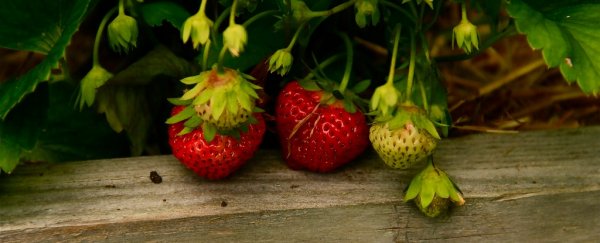It's no surprise that potatoes are often cited as our best bet for feeding a colony on Mars. They're calorie-dense and hardy enough to survive in rocky terrain. NASA is even testing different varieties of potatoes in Peru to see if they'd survive on the Martian surface. While this is great news for our Martian dreams, could you imagine eating nothing but potatoes for the rest of your life?
That situation sounds like a nightmare for anyone who likes, you know, flavours, and taste aside, it's been proven that eating a mix of foods is way more beneficial than sticking to just one. Plus, adding a pop of green colour to cut the barren Martian landscape would in all likelihood make colonists feel more at home. So what's the answer?
Strawberries! Yes, according to University of Colorado researcher Heather Hava, who recently won the 'Eat it!' category of the Lemelson-MIT Student Prize, strawberries could become the future go-to space crop because they're healthy, hardy, and provide a psychological boost thanks to their red fruit and green leaves.
According to Tamara Chuang at The Denver Post, Hava developed two different robotic devices to aid astronauts as they grow their own space plants. The first, called the SmartPot (SPOT), features a chamber that can grow different plants in whatever environment they need. The second, a device called AgQ, uses AI to collect large swathes of data about how the plants are growing and how to make them perform better.
Hava was driven to create these award-winning devices after spending two weeks inside a simulated Martian environment in Utah with other researchers. Here Hava discovered how powerful food is to humans. Not only do we need to survive, it's also vitally important to our mental well-being, she says.
"When people get sick, you hear, 'Bring flowers to the hospital.' It's not just a nice thing. It really does make a difference in people's ability to heal," Hava said. "Being able to have different colour flowers, like alpine strawberries, helps [astronauts]. While they're anticipating waiting for the fruit, they have the first stage of joy of waiting for flowers."
Unlike other designs, Hava's would take a lot of the tedious qualities away from gardening while also keeping the psychological boost. The next step involves further testing to see if the newly developed devices truly can withstand the Martian environment.
Though there's no word yet about when testing will be complete, or if the two new devices will ever make their way to Mars, it's nice to know that future colonists might not need to survive on bland potatoes alone, because that sounds like downright torture in an already tough situation.
